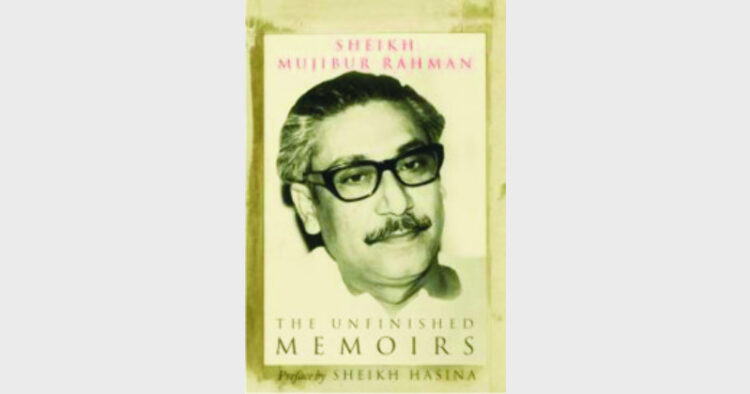MV Kamath
The Unfinished Memoirs; Sheikh Mujibur Rahman; Penguin Viking; Pp 323; Rs 699
Sheikh Mujibur Rahman, considered as the man who fathered Bangladesh, was born in a village in East Bengal, got involved in politics as early as in 1939, when he was a school student, got even more directly involved in the movement of the creation of Pakistan a year later and, when communal riots broke out in 1947, he played an active role in protecting his co-religionists. But while he was strongly in favour of Pakistan, he was even more attached to his mother tongue Bengali and when, on 23 February 1948, Prime Minister Khwaja Nazimuddin declared that “the people of East Bengal must accept Urdu as their state language”, he plunged into hectic activity to oppose the idea.
Mujibur Rahman even worked for the formation of an All-Party State Language Action Committee, in addition to calling for a general strike, that led to his arrest – the first of its kind and which was to be replicated in the years that followed. In 1953 Mujib was elected as General Secretary of the East Pakistan Awami Muslim League, later to be known just as the Awami League – and that was to be the beginning of an active and blatanantly daring political life till Bangladesh as a free country got established, when he took over the Prime Ministership of the country on 12 January 1972.
So popular was the Awami League that it won 293 seats out of the 300 in the newly set up Parliament (Jatiya Sangsad) in the election held in 1973. In 1975 the country switched over to the Presidential system and Mujib took over as Bangladesh’s first President. But there were traitors even then within the country’s Army. On 15th August 1975, a handful of ambitious and treacherous military officers, no doubt in the payroll of Islamabad, entered his residence before sunrise and assassinated him, his wife, three sons, two daughters-in-law and some other close family members – sixteen person in all.
Sheikh Hasina, one of his daughters was luckily away and lived to suffer the tragedy. Mujibur had kept Notebooks during his often long stays in prison and, as luck would have it, Hasina came across them to her utter delight. As she writes in her Preface to the book: “It was as if the Notebooks were telling me that the Golden Bengal he (Mujib) had dreamt of, still needed to be built.” The diaries Mujib left behind are remarkable for the fascinating details he has provided of his life and times. One gets insights into what went on in-1947 political developments. It may come as a surprise to many that there were strong opposition to the Partition of Bengal. Many apparently believed that the whole of Bengal plus Assam would become part of Pakistan. The sheer impertinence is unbelievable.
The Bengal Muslim League apparently hoped that Bengal would be an independent and sovereign state, that after that state was established, it would then decide whether to join India or Pakistan or remain an independent entity! Muslim leaders were unwilling to partition Bengal and wanted the whole state to be part of Pakistan.
To read Mujibur’s writings of that period is to get new insights into Muslim thinking of that area. Were all Bengal to be part of Pakistan it was also presumed that Calcutta would automatically be its capital, given its history! Mujibur’s resentment against Hindus comes through very early, especially in reference to Hindu landlords and money-lenders. He admits that his speeches were “full of religious sentiments”. “Badmouthing” Hindus was standard practice among Muslim leaders. One of the worst errors – was it only an ‘error’ or a well-callculated ‘crime’? – was to call for ‘Direct Action Day’. What ‘Direct Action’ was Jinnah talking about? All that we know is that Calcutta was turned into rivers of blood. Mujibur lays the blame for what went off on Congress and the Hindu Mahasabha. Mahatma Gandhi was present in Calcutta and was largely responsible for halting the violence.
By any reckoning East Pakistan has put all political parties in the rest of the country into insignificance. How the rest of Pakistan reacted to that development and how Mujibur was sought to be marginalised by arrogant West Pakistanis remains unrecorded – but that would have been the most exciting part of Mujibur’s life. For all that, this book is still a valued contribution to the history of South Asia, especially of the period between 1939 and 1969 and how badly West Pakistan treated its Eastern half with disdain and contempt, that was to lead to the demand for freedom. Detailed are the roles played by leaders like HS Suhrawardy, Khwaja Nazimuddin, Ataur Rahman Khan and Maulana Bhasani, to name a few. Only Mujibur comes through as a Bengali first, next and always.
(Penguin/Viking Books India Pvt Ltd, 11, Community Centre, Panchsheel Park, New Delhi-110 017)














Comments